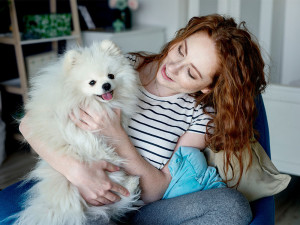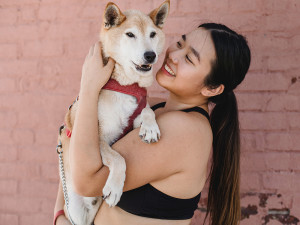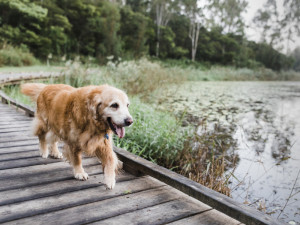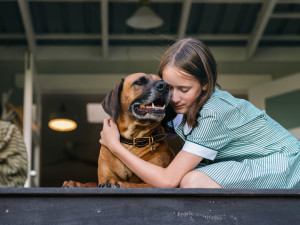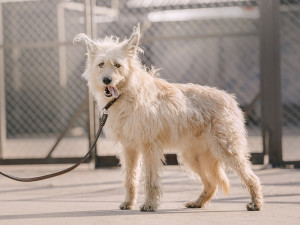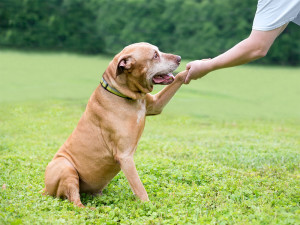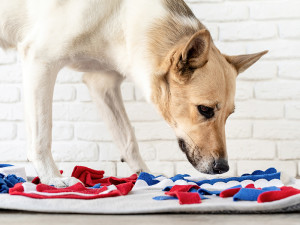7 Things You Should Know About Adopting a Senior Pet
A senior pet is the perfect addition to your family. Here’s everything you need to know before you bring them home.
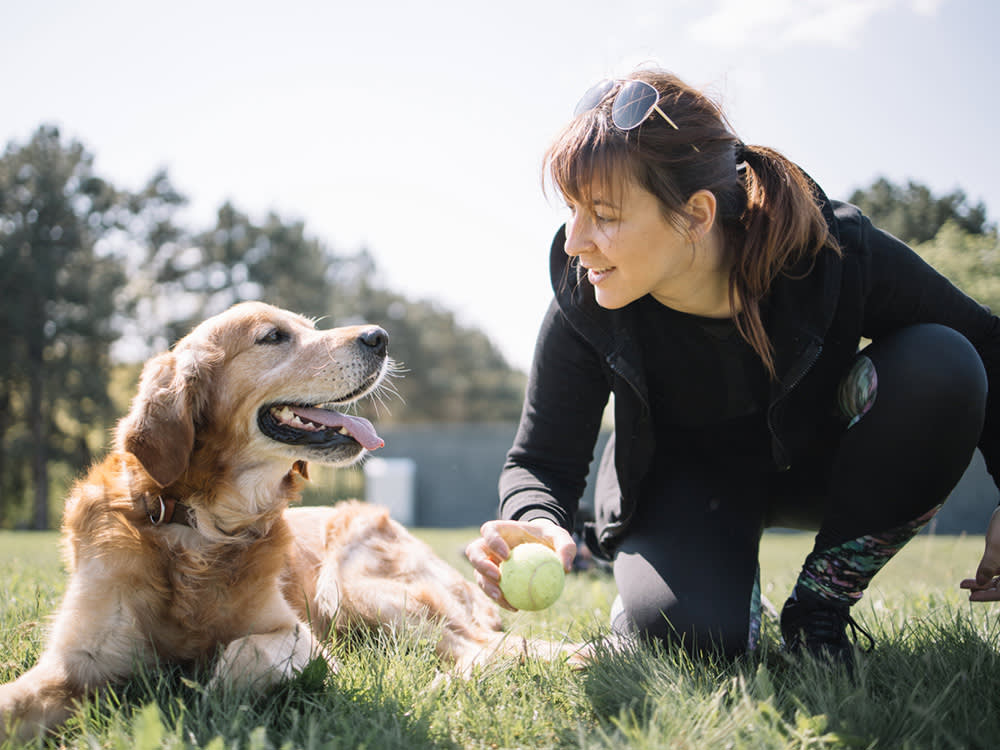
share article

Your pet wants you to read our newsletter. (Then give them a treat.)
Let’s start with the obvious: Older dogs often get an undeserved bad rap when it’s time for adoption. You’ve heard you can’t teach them new tricksopens in a new tab, that they’ll come with expensive vet billsopens in a new tab, and that they’re set in their ways. But if The Golden Girls taught us anything, it’s that anyone can have Blanche’s flair, Dorothy’s smarts, Rose’s sweetness, and Sophia’s cheekiness, no matter their age — especially your pup. The good news is that the negativity surrounding senior dogs is simply false, and this Adopt a Senior Pet Monthopens in a new tab, it’s time to learn the truth.
So, what should you really expect when adopting a senior dog? The Wildest spoke with Maddie Webb, an expert in holistic diets and senior dog careopens in a new tab who now trains staff members at a local pet supply store in Columbia, Missouri. Webb has worked in many pet care capacities and is the proud parent of a small pack of senior Dachshunds. Ironically, we sat down in a cat cafe and talked about the top seven things to know when adopting a senior dog.
1. Consider accessibility.
“I wish I would have known about accessibility issues,” says Webb, noting that she has ramps up to furniture in their home and that trips up and down stairs while carrying a dog have become part of the routine. An extra tip: Don’t be scared off by the price tags of pet ramps and stairs — they’re easy and inexpensive to make on your own.
You may even have a step stool or something similar that will work just fine. You’d be surprised how many helpful senior pet productsopens in a new tab are available, though, often at pretty affordable price points.
2. Set a health baseline.
Because you’re bringing home an adult dog without much knowledge about their past, it’s important to establish care with a vet right away. “You don’t have a history for them,” Webb says. “Establishing a baseline is super important to extend your time together.”
Getting established with a vet is a vital step for any new pet parent, but it may be even more important when you bring home a senior pup. Having a vet who knows their history in case of an emergency can save a lot of time (and money) on testing when looking for an issue. Often, vets will offer a senior dog wellness checkopens in a new tab in addition to broader evaluations when you first bring in your new family member.
3. Senior dog does not equal senior energy.
Don’t expect every senior dog to have “senior energy.” While some senior dogs may not be able to do as much strenuous or intense exercise, they still need stimulation. Many older dogs become overweightopens in a new tab, and getting them back in shape can really change their energy levels. If they’re more of a couch potato? Mental stimulationopens in a new tab is key. Replace long walks with puzzles and chews to provide an outlet for energy that can’t be let out through vigorous exercise.
“People often assign their dogs to retirement too soon,” Webb tells The Wildest. “Just because your dog is a senior dog doesn’t mean they’re ready to slow down.” It’s important to pay attention to signs and signals from your pet, but if they’re still able to keep up the same rate of run and play with no signs of increased stress, the “senior” moniker shouldn’t keep them from their regular activities.
4. Mental health matters.
“Keeping your senior dog mentally active can help prevent issues, such as sundowner syndromeopens in a new tab or dementia,” Webb says. “Even low-energy dogs need mental stimulation.” Making sure your older dog has plenty of accessible activities, feeding them in puzzle feedersopens in a new tab, and working on new skills can all help them keep their brains working.
“Every senior dog needs some kind of fitness — even if it’s just getting them on and off the couch, they need to be using their mind,” Webb says.
5. Adjustment takes time.
Senior dogs often come to shelters having lived a full life in one home — which means they’re used to doing things a certain way. And because they’ve had years to acclimate to their old routine, they may take a little more time to get used to your home and lifestyle. Always be patient and remember it’s a relationship of mutual respect. Senior dogs can acclimateopens in a new tab to all kinds of situations, but their minds aren’t always as quick to adapt as a puppy or younger dog who’s still in a developmental stage.
6. They can learn new tricks.
Yes, it’s cliché. But seriously, old dogs can learn plenty of thingsopens in a new tab, and they’ll probably enjoy doing it. We talked a little bit about mental stimulation already — and learning new tricks can be super satisfying for your pet’s brain. And if you’ve built up an impressive repertoire already, don’t forget to practice.
“Doing activities, even as simple as practicing sits and downs, can help keep their minds active,” Webb says. She often takes her seniors to try new activities like obedience and noseworkopens in a new tab, letting the pups determine which activities they like best and adding it to their regular schedules.
7. Introduce other pets slowly.
Some senior dogs have been acclimated to a life with other humans and perhaps other pets before being adopted in their older age. But even if they lived with other animals previously, that doesn’t mean your other animals will fit into their lifestyle easily. Take it slow, and don’t force introductions with other petsopens in a new tab until everyone is comfortable.
Webb’s biggest tip when it comes to these intros? “Don’t feel shameful about giving your new senior a quiet place to be alone.” Sometimes, senior dogs simply need to excuse themselves from the hustle and bustle for a moment to rest and recoup.
Ready to sign the adoption papers?
Sure, adopting a senior pet has its challenges. But so does adopting any other pet. When you adopt an older pup, you’ll likely have a better idea of their personality and maybe even some insight into their prior situation. If you need any more convincing read more from The Wildest on why you should adopt a senior dog this monthopens in a new tab.

Mollie Jackman
Mollie Jackman is a writer, editor, and graduate of Lindenwood University’s MFA in writing. She’s also a pet parent to a goofy big-eared dog and two brown tabby cats, plus a rotating cast of foster animals. When she’s not reading, writing, or picking up strays, she can be found binge-watching arguably terrible reality TV shows and cooking competitions or rolling around the local skating rink in Columbia, Missouri.
Related articles
![Brown dog with golden eyes leaning on fence]() opens in a new tab
opens in a new tabIs Your Senior Dog Sundowning?
If your senior dog seems confused, restless, or irritable after dark, they may have sundowners syndrome. Here’s how to deal.
![Young girl hugging an older dog on porch]() opens in a new tab
opens in a new tabCanine Dementia: Causes, Signs and Treatment
Learn about the signs, symptoms, and treatments.
![Dog standing in an animal shelter]() opens in a new tab
opens in a new tab“Should I Adopt an Adult Rescue Dog?”
Yes! Shelters are full of good, grown-up doggos. Here’s how to find the perfect match.
![Dogs gathered in the backyard celebrating first birthday. Unrecognizable owner holding a birthday cake with a candle.]() opens in a new tab
opens in a new tabHow to Calculate Your Dog’s Age in Human Years
A new way to convert dog years to human years.
![A senior Retriever/Terrier mixed breed dog shaking hands with its owner.]() opens in a new tab
opens in a new tabHow to Teach an Old Dog New Tricks
Your senior dog might move slower these days, but that doesn’t mean they can’t learn new things.
![Senior mixed breed dog playing with washable snuffle rug for hiding dried treats]() opens in a new tab
opens in a new tabHow to Help Your Bored Senior Dog Spice Up Their Life
Spice Girls reference aside, just because your dog is graying around the eyes doesn’t mean those eyes don’t light up at playtime.
